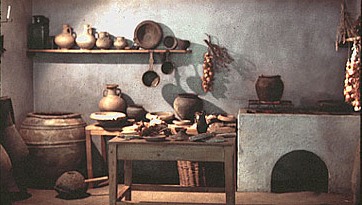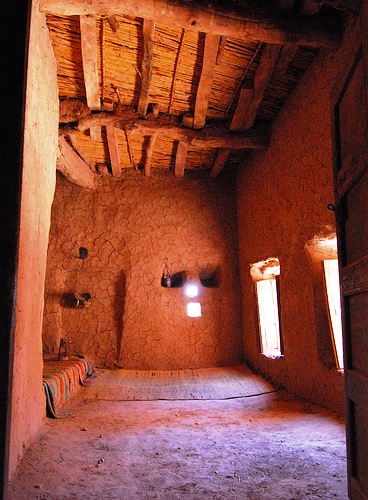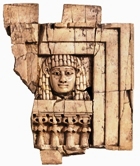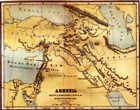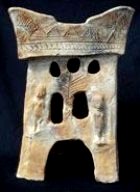Beersheba – ancient Bible city

Water, the source of life
Where is Beersheba?
Beersheba is at the southern tip of Israel. It is the last piece of fertile land before the forbidding Negev Desert. Here, travellers in ancient times would water their animals before they entered the blistering heat of the desert.
Beersheba in the south and Dan in the north: these two cities stood at either end of the land of the Bible.
Abraham at Beersheba – precious water
Without water, you died. Indeed, Beersheba is first mentioned in a story about water rights. Abraham, leader of a wandering Hebrew tribe, was looking for water as he travelled through land controlled by the local king Abimelech of Gerar (Genesis 21:25-31).
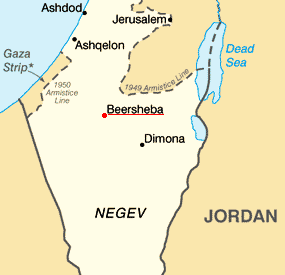
Beersheba, southern city
just north of the Negev desert
What happened at Beersheba? There was a dispute over a valuable well, and Abraham made a bargain with Abimelech: he would dig a well in the dry river bed and pay a tribute of sheep and oxen for the privilege of using the water; he also made a one-off payment of seven ewe lambs.
This sealed the agreement between the two men, giving Abraham a permanent supply of water in land he did not actually own. Abraham could water his flocks whenever he wished. It was ‘his’ well – the Hebrew word be’er means ‘well’, and sheva means ‘promise’. Before he left the area, Abraham planted a tamarisk tree.
Note: The Bible is many things:
- God’s Word of course,
- a book of ethical directions, and
- inspiring stories.
But it also contained records for the Jewish people: contracts for water rights and land tenure, and inheritance agreements. There were no central government offices for storage of records and contracts, as there are now; the people of the Bible used stories to record ownership and inheritance.
What does the Bible say Abraham did?
25 Then Abraham complained to Abimelech about a well of water that Abimelech’s servants had seized.
26 But Abimelech said, “I don’t know who has done this. You did not tell me, and I heard about it only today.”
27 So Abraham brought sheep and cattle and gave them to Abimelech, and the two men made a treaty.
28 Abraham set apart seven ewe lambs from the flock,
29 and Abimelech asked Abraham, “What is the meaning of these seven ewe lambs you have set apart by themselves?”
30 He replied, “Accept these seven lambs from my hand as a witness that I dug this well.”
31 So that place was called Beersheba, because the two men swore an oath there. Genesis 21:25-33.

A lone tamarisk tree
Isaac’s water rights in Beersheba – again…
Isaac, Abraham’s son, had made a similar pact about water with the same king (or his son, the meaning in the Bible is not clear). But there was trouble ahead.
Isaac was extraordinarily successful at whatever he did. His crops flourished, his flocks grew, and he began to amass considerable wealth.
A mixed blessing
You would think this was a blessing. But his success proved his downfall, since the local herdsmen thought he was using more than his fair share of available water resources. He was asked to leave, presumably with the threat of violence if he did not go. He went.
Later on he returned. When he did, he found that the wells dug by his father had been filled with stones and earth, and thereby made useless. Undeterred, he set about restoring them, and in the process restored his own fortunes as well.
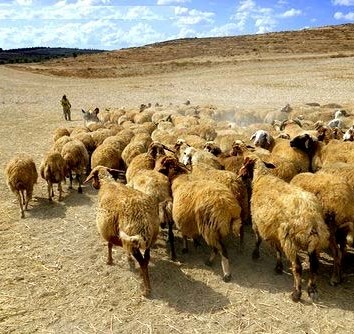
Shepherd and flock in an arid landscape
How does the Bible describe it?
23 From there he (Isaac) went up to Beersheba.
24 That night the Lord appeared to him and said, “I am the God of your father Abraham. Do not be afraid, for I am with you; I will bless you and will increase the number of your descendants for the sake of my servant Abraham.”
25 Isaac built an altar there and called on the name of the Lord. There he pitched his tent, and there his servants dug a well.
26 Meanwhile, Abimelech had come to him from Gerar, with Ahuzzath his personal adviser and Phicol the commander of his forces.
27 Isaac asked them, “Why have you come to me, since you were hostile to me and sent me away?”
28 They answered, “We saw clearly that the Lord was with you; so we said, ‘There ought to be a sworn agreement between us’-between us and you. Let us make a treaty with you
29 that you will do us no harm, just as we did not molest you but always treated you well and sent you away in peace. Now you are blessed by the Lord.”
30 Isaac then made a feast for them, and they ate and drank.
31 Early the next morning the men swore an oath to each other. Then Isaac sent them on their way, and they left him in peace.
32 That day Isaac’s servants came and told him about the well they had dug. They said, “We’ve found water!”
33 He called it Shibah, and to this day the name of the town has been Beersheba.
Genesis 26:23–33
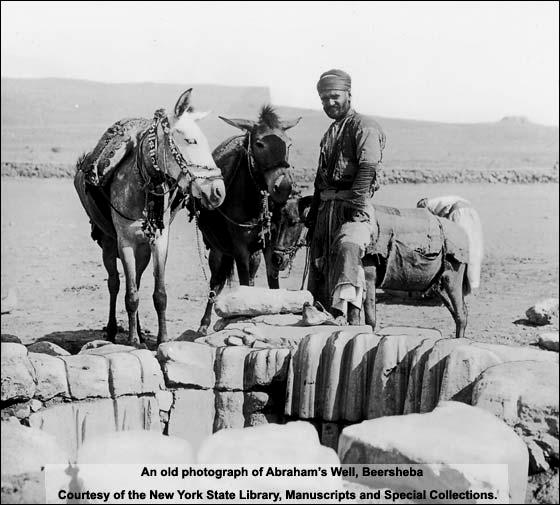
Abraham’s well at Beersheba, 19th century photograph
Isaac’s son Jacob offered sacrifice to Yahweh at Beersheba, but so did the followers of fertility religions.
1 So Israel set out with all that was his, and when he reached Beersheba, he offered sacrifices to the God of his father Isaac.
2 And God spoke to Israel in a vision at night and said, “Jacob! Jacob!” “Here I am,” he replied.
3 “I am God, the God of your father,” he said. “Do not be afraid to go down to Egypt, for I will make you into a great nation there.” Genesis 46:1–3
You can read about the different types of sacrifice at Ancient Altars: what they were like and what actually happened at a sacrifice ceremony.
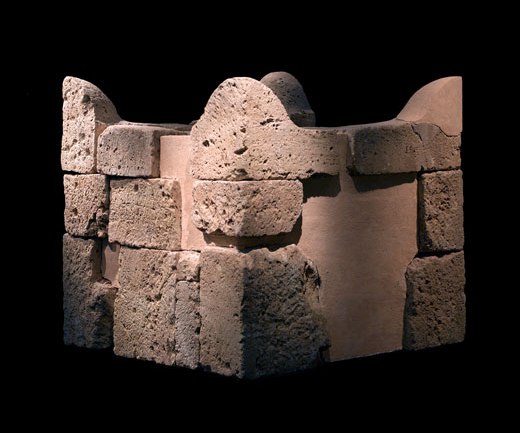
Reassembled ancient sacrificial altar found at Beersheba
The Beersheba Altar
When archaeologists were excavating at the ancient site of Beersheba, they found
- several large, carefully shaped stones set into the town walls, dating back to the late 8th century BC
- the stones, when they were reassembled, formed a cubical altar with four tapered projections or ‘horns’ (see above)
- one of the stone blocks had a snake carved onto it – snakes were common symbols of rebirth in Middle Eastern religions
- the top stones of the altar were blackened, suggesting burnt sacrifices.
The altar may have been dismantled at the time of King Hezekiah’s religious reforms in the 8th century BC. When this happened, the stones were not smashed, but recycled. Waste not, want not.
Why did the Beersheba altar have ‘horns’?
There have been various theories about why the altar had projecting ‘horns’. The most common is that they had a symbolic meaning – cows, bulls and calves were common symbols of the fertility gods. Think of the story of the Golden Calf in Exodus 32.
Two separate areas would have been needed at a sacrificial altar:
- one to slaughter the animal
- another to burn it as an offering.
The same area could not be used for both actions, since the amount of blood flowing from the animal would saturate the ground, making fire impossible. So while the reconstructed stones appear to have been an altar, it is not clear what the altar’s exact purpose was.
It shows, however, that worship of the fertility gods continued for centuries after people began to worship Yahweh as their god.
What was the city of Beersheba like?
The top layer of excavations at Beersheba shows it as it was in the 8th century BC. This is the city Elijah saw when he fled from the wrath of Jezebel, after the murder of her priests of Baal.
1 Now Ahab told Jezebel everything Elijah had done and how he had killed all the prophets with the sword.
2 So Jezebel sent a messenger to Elijah to say, “May the gods deal with me, be it ever so severely, if by this time tomorrow I do not make your life like that of one of them.”
3 Elijah was afraid and ran for his life. When he came to Beersheba in Judah, he left his servant there. I Kings 19:1-3
It was a remarkable city, laid out in separate quarters with orderly streets following the inside of the city wall and a main street through the town center. All these streets met in a square inside the main city gate – obviously the main meeting place. There was
- a palace for the governor near the city gate, with three large reception halls
- a drainage system for rainwater, channeling it into wells or outside the city
- a communal cistern or well with a stone staircase going down into the foundation rock; this meant the city always had fresh water
- storehouses for grain and oil collected as taxes from the surrounding countryside.
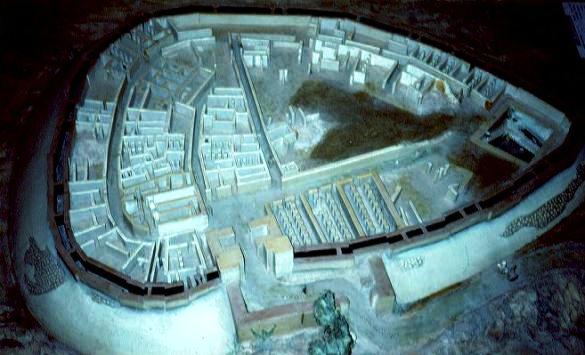
A model of the ancient city of Beersheba, with palace, warehouses, and houses of officials and servants. It was an administrative center for the country, and a bolt-hole during invasion.
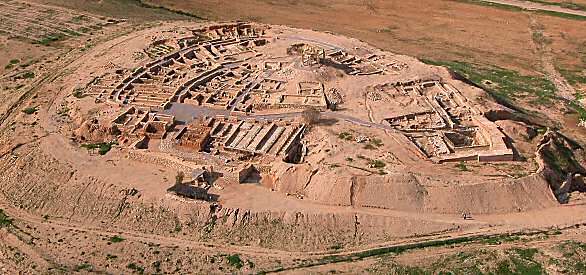
Aerial view of Beersheba excavations
What were houses in ancient Israel like?
You would enter each house by a narrow wooden door. This was the only part of the house that opened onto the street.
Most of the houses in Beersheba had four sections, one of which was a courtyard – see Houses in Bible Lands for floor-plans and drawings.
The rooms would have seemed very small to us, even claustrophobic – rooms could only be as wide as the beams that supported the roof, and large beams were hard to get, and expensive.
The rooms were also stuffy, since there was a minimum of windows. There was of course no glass in the windows: lattice work and shutters covered the openings.
Stairs or a wooden ladder led up onto a flat roof, which was used as an outdoor room partly shaded by woven matting – think of Bathsheba bathing on her roof when King David saw her….
This space and the courtyard were the main work areas, since they were the only well-lit and airy places. Tasks performed here included
- spinning and weaving
- food preparation
- sleeping, in warm weather
- drying food or textiles.
The houses was crowded with people at all times of the day and night. There was virtually no privacy – anything a person did, no matter how intimate, was done in the presence of others.
Bible study ideas: Beersheba
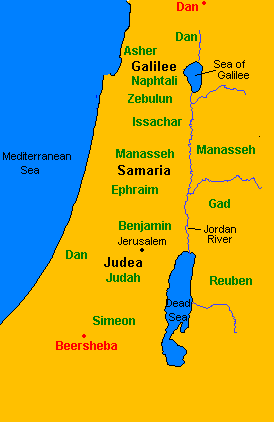
‘From Dan to Beersheba’ map
‘This Land Is Mine’
Read the story of Abraham and his acquisition of water rights at Beersheba – you’ll find the Bible text above.
Write a short story about the acquisition of your own home: develop a ‘sacred story’ for future generations of your family:
- make a point-form summary of the events you remember best
- try to include some element that would make the story unique to your own family
- flesh out the story with more details
- involve all the main members of your family if possible.
Worshipping False Gods
The 1st Commandment forbids us to worship false gods : ‘Thou shalt not worship false gods before Me.’ But all too frequently we do. What other gods do you worship? Money? Youthful looks? Your job? A perfect body?
- Name your own false gods. Write a short description of the ‘god’, and why you worship it so much.
- Imagine that you have to wean yourself off this god. How would you do it?
Are you disappointed with your life?
Samuel was disappointed in his two sons – read the text from I Samuel 8:1-3:
1 When Samuel grew old, he appointed his sons as judges for Israel.
2 The name of his firstborn was Joel and the name of his second was Abijah, and they served at Beersheba.
3 But his sons did not walk in his ways. They turned aside after dishonest gain and accepted bribes and perverted justice.
- How do you accept the fact that your children, or your parents, may not be all you hoped for?
- Do you accept them anyway? Or ask more of them?
- Do you have the same high expectations of yourself?
Share your response to these questions with a friend, or spend some quiet time thinking about the answers.
Extra Bible references to Beersheba
The southern boundary marker of ancient Israel, Judges 20:1 1 Samuel 3:20; 2 Samuel 3:10
Jacob went out from Beersheba towards Haran, Genesis 28:10
In the inheritance of Judah, Joshua 15:20, 28:2, 2 Samuel 24:7
Afterwards assigned to Simeon, Joshua 19:2, 9; 1 Chronicles 4:28
Became a place of worship of the fertility gods, Amos 5:5; 8:14
Bible Study Resource for Women in the Bible
Beersheba, story of the city with Bible texts and activities
© Copyright 2006
Elizabeth Fletcher

